If you’re looking for an inexpensive and safe way to get rid of weeds in your garden, a homemade weed killer may be the solution you need. With a few simple ingredients like vinegar, salt, and dish soap, you can make a natural weed killer that is just as effective as commercial herbicides. Plus, you won’t have to worry about harsh chemicals harming your plants or the environment.
This post may contain affiliate links.
Why Use Homemade Weed Killer?
If you’re looking for a safe and inexpensive way to control weeds in your garden, homemade weed killers are a great option. Using natural ingredients like vinegar, salt, and dish soap, you can create a non-toxic and effective solution that won’t harm your plants or soil.
One of the biggest advantages of using homemade weed killers is that they don’t contain harsh chemicals like commercial herbicides. These chemicals can be harmful to your health and the environment, and they can also damage your soil and plants.
Homemade weed killers, on the other hand, are made from natural ingredients that won’t harm your plants or soil.
Related Article: How to Make Homemade Plant Food
Another advantage of using homemade weed killers is that they’re easy to make and use. All you need are a few simple ingredients and a spray bottle, and you’re ready to go.
Plus, you can customize your homemade weed killer to target specific types of weeds, whether they’re annuals, perennials, or grassy weeds.
Homemade weed killers are also a great way to save money on weed control. Commercial herbicides can be expensive, especially if you need to use them frequently.
Homemade weed killers, on the other hand, are made from inexpensive ingredients that you probably already have in your kitchen.
Using homemade weed killers can also be beneficial for your soil health. Many commercial herbicides can damage the soil, making it more difficult for plants to grow.
Homemade weed killers, on the other hand, are made from natural ingredients that won’t harm your soil or the beneficial microbes that live in it.
Overall, homemade weed killers are a safe, effective, and inexpensive way to control weeds in your garden. Whether you’re looking to target specific types of weeds or just keep your garden weed-free, there’s a homemade weed killer recipe out there that’s right for you.
Just remember to use caution when applying any type of weed killer, and always follow the safety precautions listed on the label.
Related Article: Using Epsom Salt as a Natural Fertilizer in the Garden
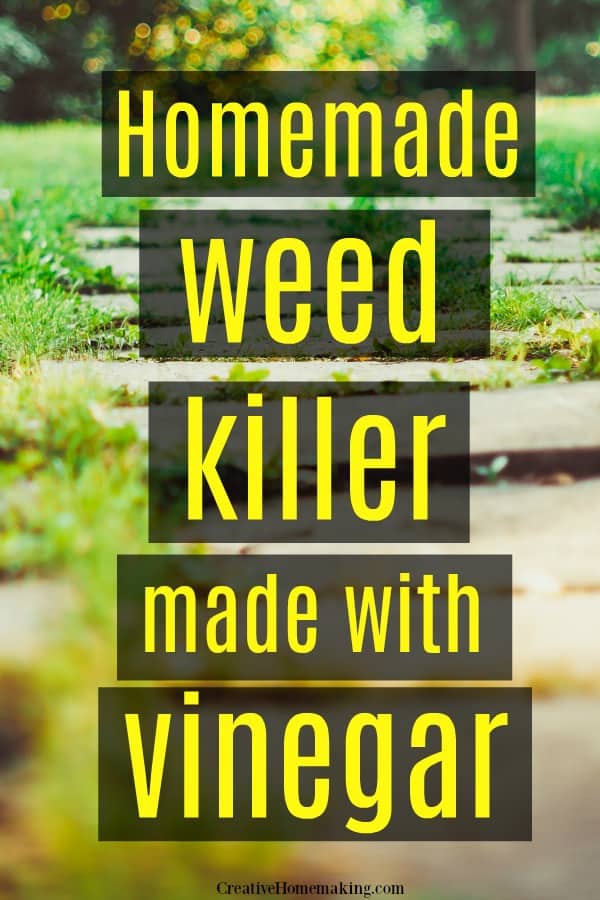
Homemade Weed Killer Recipes
Here are some homemade weed killer recipes that you can try:
Vinegar and Dish Soap Weed Killer
One of the most popular homemade weed killers is a mixture of white vinegar and dish soap. The acetic acid in the vinegar kills the weeds, while the dish soap helps the solution stick to the leaves.
To make this weed killer, mix one gallon of white vinegar with one cup of dish soap in a spray bottle. Spray the solution on the leaves of the weeds on a sunny day.
Related Article: Homemade Windshield Wiper Fluid
Salt and Vinegar Weed Killer
Another effective homemade weed killer is a mixture of salt and vinegar. The salt draws moisture out of the weeds, while the acetic acid in the vinegar kills the leaves.
To make this weed killer, mix one gallon of white vinegar with two cups of table salt in a spray bottle. Spray the solution on the leaves of the weeds on a sunny day, being careful not to get it on any plants you want to keep.
Boiling Water Weed Killer
If you have weeds growing in cracks in your driveway or sidewalk, boiling water can be an effective way to kill them. Simply boil a pot of water and pour it over the weeds. Be careful not to get the water on any plants you want to keep.
Related Article: 5 DIY Bug Sprays for the Garden
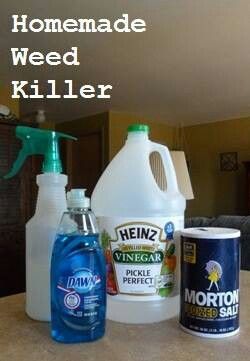
Rubbing Alcohol Weed Killer
Rubbing alcohol can also be an effective weed killer, especially for perennial weeds. To make this weed killer, mix one gallon of water with one quart of rubbing alcohol in a spray bottle. Spray the solution on the leaves of the weeds on a sunny day.
Lemon Juice Weed Killer
Lemon juice is another natural weed killer that can be effective for small weeds. To make this weed killer, mix one gallon of water with one cup of lemon juice in a spray bottle. Spray the solution on the leaves of the weeds on a sunny day.
Epsom Salt Weed Killer
Epsom salt can be an effective weed killer for weeds with a taproot system. To make this weed killer, mix two cups of Epsom salt with one gallon of water in a spray bottle. Spray the solution on the leaves of the weeds on a sunny day.
Baking Soda Weed Killer
Baking soda can be an effective weed killer for small weeds. To make this weed killer, mix one gallon of water with one cup of baking soda in a spray bottle. Spray the solution on the leaves of the weeds on a sunny day.
Corn Gluten Meal Weed Preventer
Corn gluten meal is a natural pre-emergent herbicide that can prevent weed seeds from germinating. To use corn gluten meal as a weed preventer, sprinkle it on your garden beds in the spring and fall. Be sure to water it in well.
Related Article: How to Use Banana Peels to Fertilize Houseplants
Remember to always use caution when using homemade weed killers, especially around healthy plants. Be sure to read and follow all safety precautions, and never use harsh chemicals or commercial herbicides.
With these homemade weed killer recipes, you can have a healthy lawn and garden without the use of harmful chemicals.
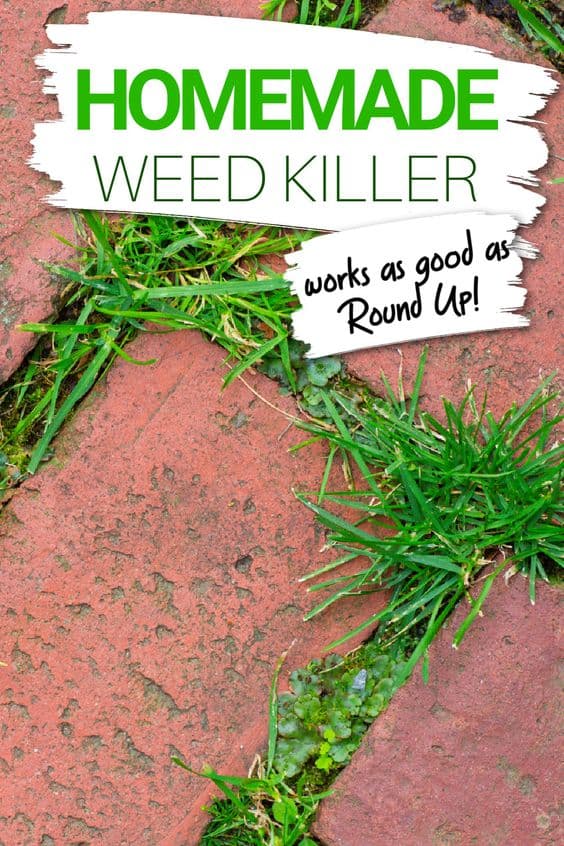
Application Techniques
When it comes to applying homemade weed killer, there are several techniques you can use. Here are some common methods:
Spray Bottle Application
One of the easiest ways to apply homemade weed killer is with a spray bottle. This method works well for small areas or individual weeds. You can mix up your weed killer solution and pour it into a spray bottle.
Then, simply spray the solution directly onto the weeds. Be sure to focus on the leaves and stems, as this is where the solution will be most effective.
Pouring Application
For larger areas, pouring your weed killer solution directly onto the weeds may be more effective. This method works well for driveways, sidewalks, and other areas where you don’t need to worry about damaging nearby plants.
Simply mix up your solution and pour it directly onto the weeds. Be sure to saturate the leaves and stems thoroughly.
Brush Application
If you have weeds growing in cracks or crevices, a brush application may be the best option. This method involves using a brush to apply the weed killer solution directly to the weeds.
Be sure to use a stiff-bristled brush to get into all the nooks and crannies. This method may take a bit more time and effort, but it can be very effective for hard-to-reach areas.
Propane Torch Application
For weeds growing in gravel or other non-flammable areas, a propane torch can be an effective way to kill weeds. This method involves using a propane torch to heat up the weeds until they wilt and die. Be sure to use caution when using a propane torch, as it can be dangerous if not used properly.
Related Article: Lemon and Lemon Peel as a Safe Alternative to Pesticides
Frequently Asked Questions
What is a pet-friendly homemade weed killer?
A pet-friendly homemade weed killer is a natural weed killer that does not contain any harmful chemicals that can be dangerous for pets. These weed killers are made using natural ingredients such as vinegar, salt, and dish soap.
How do I make a natural weed killer with vinegar and dawn?
To make a natural weed killer with vinegar and dawn, you will need to mix one gallon of white vinegar, one cup of salt, and one tablespoon of dawn dish soap.
Mix the ingredients well and pour the solution into a spray bottle. Spray the solution directly onto the weeds, making sure to cover the entire plant. This solution is effective at killing weeds, and the dish soap helps the solution stick to the leaves of the plant.
What is the strongest natural weed killer?
The strongest natural weed killer is a solution made from vinegar, salt, and dish soap. This solution is effective at killing weeds and can be made by mixing one gallon of white vinegar, one cup of salt, and one tablespoon of dish soap.
Mix the ingredients well and pour the solution into a spray bottle. Spray the solution directly onto the weeds, making sure to cover the entire plant.
Follow my gardening board on Pinterest.
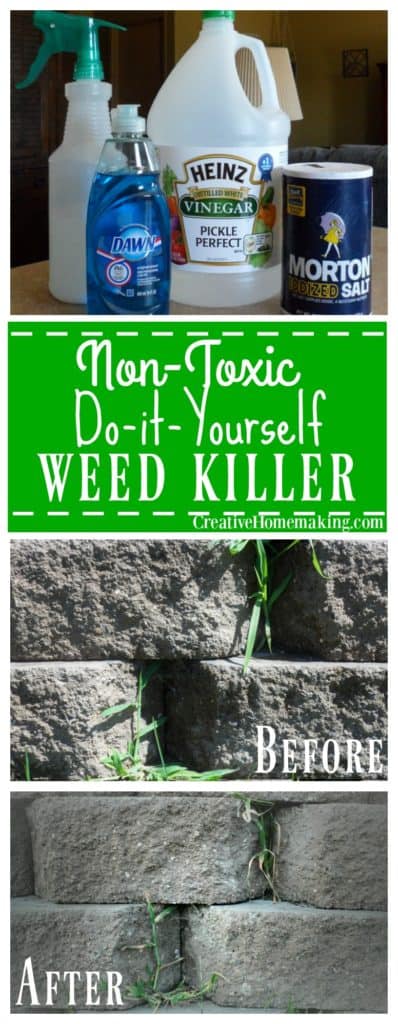
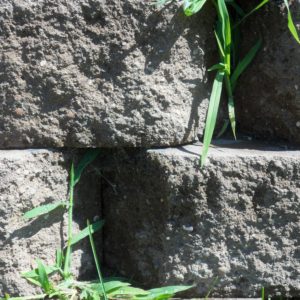
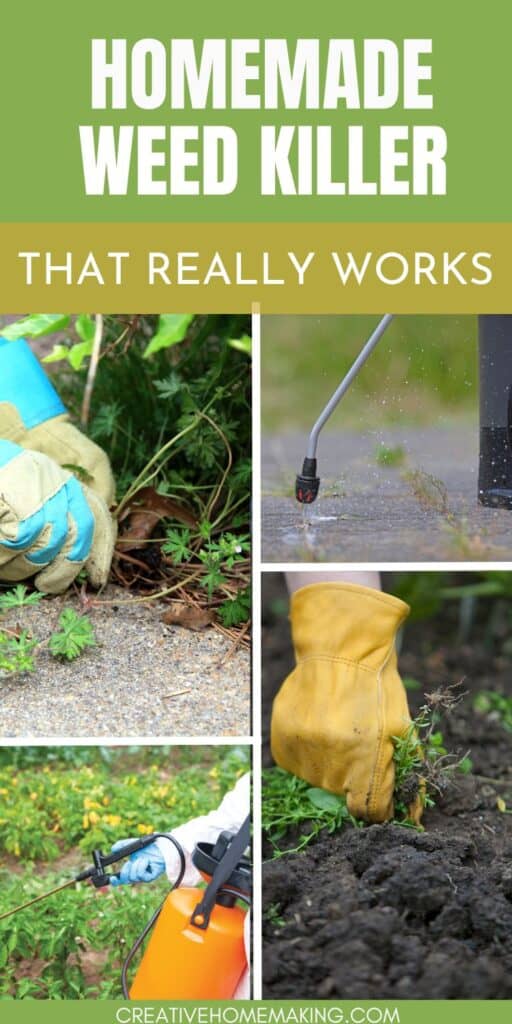


Will regular 5% cooking white vinegar work?
How long do you have to wait if you want to plant something else in the same spot after the weds have died? I just moved and the weeds at my new place are out of control. Thanks
Hi! I’m not sure, but I think it is at least a couple of years. The salt really kills the nutrients in the soil. It might not take as long if you add new soil to the location. I’d definitely test it out first before you plant a bunch of stuff there!
The most important thing about Roundup is it is extremely toxic to our Mother Earth and Bees!
Yes, Round up is a very toxic two animals and the environment and that’s why you don’t want to use it!
I tried this & it really worked great!! It’s not for really big projects, but is wonderful for weeds on the borders of flower beds & in cracks of brick work, etc. Do be careful though because it will kill whatever it touches, so don’t get it too close to your flowers. It is a great solution for those small projects.